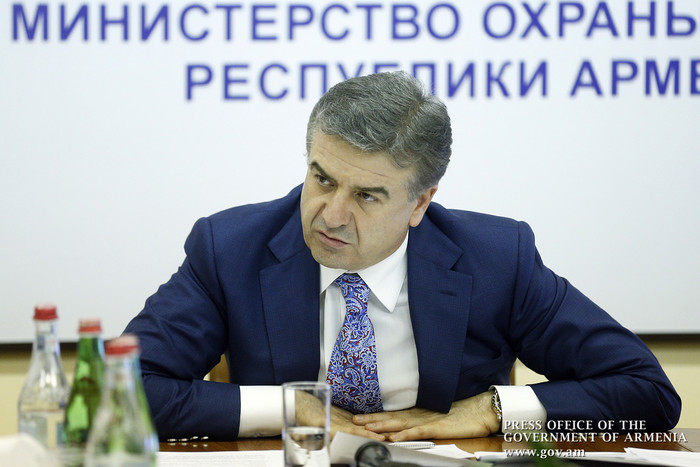Prime Minister Karen Karapetyan visited the State Property Management Department (SPMD) to inspect the process of State property privatization programs and the ongoing reform. After stating his expectations of SPMD activities, the Prime Minister noted that it should be an efficacious structure to bring about commercial success.
“It is extremely important. Today, our budget is mostly conservative in nature, and if we fail to make investments in capital construction and infrastructure development, we will have what we have. In this respect, the effective work of State Property Management Department is one of the sources for development of capital construction,” Karen Karapetyan said, prioritizing the optimization of State-owned property, the formulation of recommendations and the provision of new opportunities for implementation of investment projects.
State Property Management Department Head Arman Sahakyan reported on the Department’s functionality, the main reform guidelines, which he said might foster the development of others sectors and boost the State budget receipts. 13 projects were said to have been presented aimed at boosting market opportunities in terms of real estate sales. Possibilities have been identified for the transfer of immovable property.
Estimated at a total cost of USD 240 million, the project has already been sent to the Ministry of Economic Development and Investment. In addition, 63 real estate units were put up for sale in 2017, of which 24 have already been sold through tender leading to AMD 236 million in overall receipts. AMD 600 million is expected from the alienation of all 63 units of State property. The 2017-2020 State property privatization program has been developed, which provides for AMD 35 billion in budget receipts.
Prime Minister Karapetyan asked about the total number of State-owned immovable assets available nationwide, including the number of units eligible for alienation. The Premier stressed the importance of digitization in this process.
“All idle assets should be activated in order to attract resources for making investments in infrastructure. In this regard, you need to highlight the role of your department and submit proposals to that effect,” the Head of Government said, instructing Arman Sahakyan to present an estimate of the overall amount of public property.
Karen Karapetyan emphasized that the auctions for the sale of public property should be open and transparent as much as possible. The Premier stressed the need to involve highly experienced real estate agencies in the sales of State-owned assets.
Arman Sahakyan noted that this approach had been stipulated in the program of reforms. “It needs to be materialized as boldly and rapidly as possible,” the Premier said, adding that the Department was expected to make forecasts and analyses on the State property privatization process.
“You should have an active team here. We need creative and unconventional approaches. I would like to see here officers with a commercial rather than a bureaucratic mindset, free in their activities, not limited to tying a cravat from day to day who can provide for better property management, sales, etc. The more business-oriented you are, the higher profits we will gain,” Karen Karapetyan said, highlighting the role of the capital market in the sales of public assets.
Reference was also made to the activities of enterprises with State participation, and the programs for 2017. Arman Sahakyan advised that their managers were told to provide for higher profits, increased efficiency and eliminate the existing problems. They will be asked to submit quarterly, semi-annual and annual reports. Intolerance will be shown to those entities with unsatisfactory results. The rules of the game will be very tight.
Emphasizing that efforts should be continued in this direction, Karen Karapetyan said the process of privatization of State-owned enterprises should be stepped up ahead.
In conclusion, the meeting discussed issues related to the planned structural changes in the State Property Management Department, organization of electronic auctions, updating of databases, etc.



















































